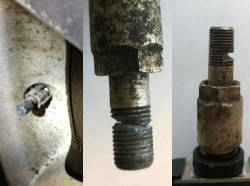
— A Chrysler tire valve stem class-action lawsuit has been partially dismissed concerning claims the stems and caps corrode in 2010 Chrysler Town & Country, 2010 Dodge Grand Caravan, 2010 Jeep Liberty and 2010 Dodge Journey vehicles.
The plaintiffs allege the vehicles, manufactured after June 10, 2009, are equipped with defective copper-bearing aluminum metal alloy valve stems. The valve stems work with the tire pressure monitoring systems and are allegedly prone to corrosion from elements such as road salt.
According to the plaintiffs, the valve stems create safety hazards because when the stems fail, air can quickly be released from the tires without warning.
The class-action lawsuit alleges Fiat Chrysler (FCA) allegedly knew the valve stems were defective because the automaker stopped using the metal parts and replaced them with rubberized valve stems. In addition, the lawsuit alleges owners have filed multiple complaints about corroded valve stems and the high cost to replace them.
According to the plaintiffs, Chrysler doesn't offer to reimburse owners for out-of-pocket costs associated with replacing the valve stems. And because the valve stems are part of the computerized tire pressure monitoring systems, replacing four stems can easily cost $200.
The judge looked at claims that FCA violated the Ohio Consumer Sales Practices Act by "knowingly placing into the stream of commerce Class Vehicles equipped with defective TPMS valve stems that result in, among other problems, sudden and unexpected tire air-outs."
In addition, at issue are claims of "concealing the defect in the Class Vehicles [and] failing to inform Plaintiff Lett and the other Ohio Class members of this defect."
Chrysler countered the statute of limitations mean the claims "may not be brought more than two years after the occurrence of the violation which is the subject of suit." The judge sided with FCA because more than two years had passed when the plaintiff filed the lawsuit.
The judge followed similar reasoning when claims of violating the Michigan Consumer Protection Act were denied because the judge ruled they were time-barred.
Chrysler also used the time-barred argument concerning alleged violations of the Massachusetts Consumer Protection Act, but the judge denied the automaker's motion to dismiss.
According to the judge, the plaintiff showed enough evidence at this stage of the proceedings to plead she didn't have reason to know about the valve stems until her mechanic told her in December 2014.
Overall, the judge granted FCA's motion to dismiss express warranty claims, Ohio Consumer Sales Practices Act claims and Michigan Consumer Protection Act claims.
Allowed to proceed are Michigan and Massachusetts implied warranty claims and violation of the Massachusetts Consumer Protection Act.
The Chrysler tire valve stem lawsuit was filed in the U.S. District Court for the District of Delaware - Canfield, et al., v. FCA US LLC.
The plaintiffs are represented by Kantrowitz Goldhamer & Graifman, P.C., the Law Offices Of Elmer Robert Keach III, P.C., Migliaccio & Rathod LLP, Parker Waichman LLP, Rosenthal Monhait & Goddess PA, and Whitfield Bryson & Mason LLP.
CarComplaints.com has owner-reported complaints about the vehicles named in the valve stem class-action lawsuit.
- Chrysler Town & Country - 2010 / All model years
- Dodge Grand Caravan - 2010 / All model years
- Jeep Liberty - 2010 / All model years
- Dodge Journey - 2010 / All model years




